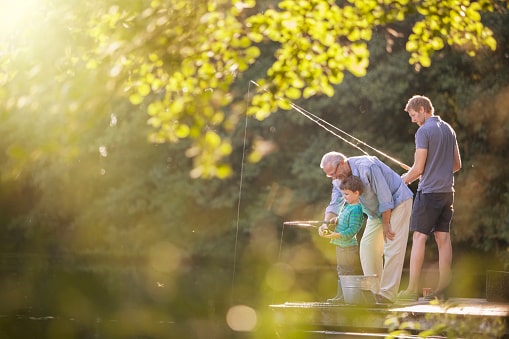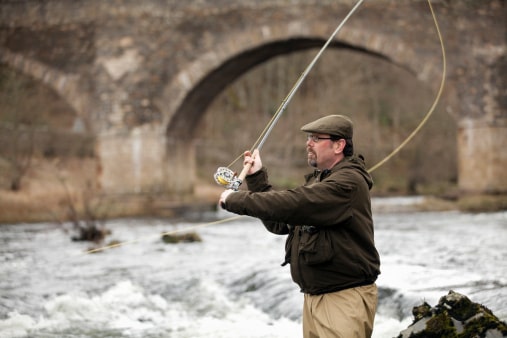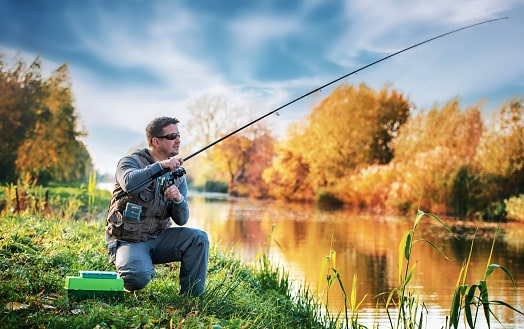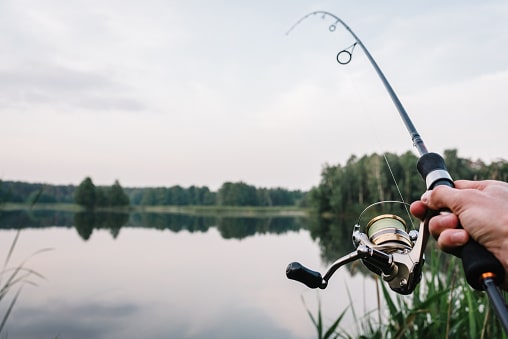If you’re looking for a fun activity that will get you outside in nature, this guide to fishing for beginners will give you somewhere to start.
In this blog, we’ll go through the different types of fishing, the licensing and permissions you’ll need, how to fish, and more! Before we get started with the different types of fishing, let’s go over the benefits of learning to fish.

Why should you try fishing?
Like many other outdoor sports, fishing has many benefits. Not only can it help keep you fit and get you outside into nature, but it can also help improve your focus and concentration.
Spending more time outside means getting more Vitamin D, even in the UK’s temperamental weather. If you can get a group of friends together who also enjoy fishing or want to give it a try, it’s the perfect way to spend time with friends, too.
Different types of fishing
There are many different forms of fishing (this list names 33 different approaches to fishing), but we’ll focus on three of the most popular types of fishing that you’ll find in the UK:
Coarse fishing
Coarse fishing is the most popular form of angling (referring to fishing with a rod and line) in the UK. It involves catching freshwater fish with a rod and returning them to the water afterwards (once you’ve taken an obligatory photo of your catch). Coarse fishing gets its name from the fact that some coarse fish feel rough to the touch, making them an undesirable choice for food. This blog focuses predominantly on coarse fishing, as it’s widely considered the best type of fishing for beginners.
Game fishing
Game fishing refers specifically to fishing for freshwater fish that can be eaten, such as trout and salmon.
Sea fishing
This type of fishing really does what it says on the tin: it involves catching fish from the sea, such as cod and bass.

Do I need a fishing licence?
You’ll need a rod licence to fish from any inland waters in the UK. You can apply for a rod licence from the Environment Agency, with prices ranging from free to £90 (depending on your age), what fish you’ll be catching, and how long you need a licence for.
The rod licence covers you for fishing in England, Wales, and the Border Esk region (including parts of the river in Scotland) when fishing for salmon, trout, freshwater fish, smelt, or eel with a rod and line.
If you’re found to be fishing without a rod licence, you could be fined up to £2,500, so it’s always worth reading up on before you head out on your first trip.
It’s important to note that having a rod licence doesn’t give you permission to fish anywhere you want, but we’ll go into more detail on this next.
Where am I allowed to fish?
To find out where you can and can’t fish, you’re best off looking into your local bylaws and restrictions on fishing in your area. You’ll likely need to get a permit, so you have permission from whoever owns the rights to that particular stretch of water to fish from it. You can usually get a permit from your local angling club or the Canal and River Trust.
Related: How to start a fishery
The ideal fishing kit for beginners
As you’re just starting out in the world of coarse fishing, you don’t want to spend loads of money on your kit before you know what works best. To give you a good starting point, though, it’s a good idea to have the following in your fishing kit:
- a fishing pole, whip, or rod and reel (more on this in the next section)
- fishing line
- disgorger (this helps you unhook the fish once you’ve caught them)
- hooks
- bait Maggots, worms, and/or sweetcorn
- floats
- weights
- a tackle box
- scissors or a line cutter
- a landing net and unhooking mat (this will help you get heavier fish out of the water and stops fish from being damaged from putting them on the ground)

The best type of fishing for beginners: Pole and whip fishing
We’ve mentioned already that coarse fishing is the best type of fishing for beginners, but what do you actually need to do? The easiest approach to coarse fishing is pole and whip fishing.
This style involves using the least amount of gear, and you don’t need to wrestle with a reel while trying to catch a fish. Instead of a reel, a pole (also called a whip) has a bit of elastic attached to the top.
You’ll need to attach your pole rig (consisting of a line, float, weights, and hook) to your pole and use a plummet and float to determine the best depth for catching fish, which may require some testing on your part to see what works best.
Once you feel a fish tugging on your line, you can whip your pole up and place the fish in your landing net. It often helps to have an expert show you the best approach for fishing so you can learn all the tips and tricks. The Canal and River Trust run free Let’s Fish events where you can do just that!
How to handle a fish for beginners
One of the most important aspects of fishing for beginners is learning how to safely handle a fish and return them to the water. This ensures that the fish population in your local fishing spots stays healthy and limits the damage inflicted on them.
Here are some quick tips to get you started:
- Always wet your hands before handling the fish: This ensures you don’t remove too much of the slime found on their bodies, which protects them from bacteria and diseases.
- Return the fish to the water quickly: This may sound obvious, but it should be a priority to return the fish to the water as soon as possible.
- Don’t use a barbed hook: This will cause more damage to the fish when trying to remove the hook.
- If you make a large catch, use an unhooking mat: Placing the fish directly on the floor to unhook it may injure the fish further.
- Don’t throw the fish back into the water: You should always gently hold the fish in the water until you can feel it trying to swim away.
Fishing etiquette
Before you head out with your fishing gear for the first time, it’s always worth learning some fishing etiquette to ensure you’re being as polite as possible to the people and environment around you. Some of our top tips are:
1. Be mindful of other anglers
Fishing effectively often requires peace and quiet. This helps other anglers keep their focus and prevents you from scaring away the fish. It’s best to try and keep noise to a minimum, such as using earphones instead of a speaker if you like to listen to music while you fish.
It’s also important that you make an effort not to encroach on another angler’s space, it’s good practice to leave a couple of fishing spots between you and the next angler if you can. As part of this, if you’re walking behind another angler picking their fishing spot, it’s polite to let them pick their space first instead of rushing ahead of them to get the best spot.
2. Respect the wildlife
Respecting the wildlife in the area where you’re fishing is of the utmost importance. Our section above provides guidance on how to properly handle and return fish to the water to ensure the least disturbance possible.
It’s also important to pick up any litter you’ve left around you before you leave for the day, including any of your kit. You could even pick up some litter as you leave if you notice others have not been so careful.
3. Don’t try to hoard a spot
Much like holidaymakers leaving their towels on sunbeds by the pool, it’s usually seen as impolite to claim a space as your spot (especially if someone has already set up there). It’s also best not to leave your spot for a prolonged period, as this could be taking away the opportunity for another angler to catch fish.
4. Keep an eye out when casting
If you’ll be fishing in a busy area, remember that often these spaces aren’t just for fishing! Always regularly check the space around you in case someone is passing by or has approached you without noticing. The last thing you want is to cause anyone injury because you haven’t carried out the proper checks.
5. Brush up on the rules
Every location you visit, and the local angling club in charge of that stretch of water may have different rules for anglers to follow. It’s best to carry out your own research beforehand to ensure you’re following local guidance regarding others and the wildlife you’re sharing this space with.
For example, some locations may restrict the time of year you can fish, set size limits, and limit the number of fish you can catch.
6. Offer help to others when you can
As you work on your skills, you may notice other anglers just starting their fishing journey. If you notice them struggling or have a helpful tip to help them pick up the sport quicker, why not share it? You may find others offer you the same courtesy as you learn.

When is the best time to go coarse fishing?
The best time to go coarse fishing varies greatly depending on the type of fish you’re trying to catch, the time of year, and where you’ll be fishing. It’s worth noting that there is a close season for coarse fishing that applies to all rivers and some sections of canals that connect to rivers. The close season usually runs from 15th March to 15th June and helps protect fish populations whilst they spawn.
Whilst the close season is in place, you’ll often find you still have the opportunity to practice angling at your local fishery, canals, and still waters (although you should always check in case they have a close season also).
Generally speaking, you want to go coarse fishing in good weather where the water will be warmer, and the fish more active. If you’re looking for the best time to go fishing for a certain species of fish, it’s best to conduct your own research on where they’re likely to be at different times of the day. For example, carp will often be found feeding in the shallows in the early morning and in deeper water during the evening, so you’ll need to adapt your approach to catching them depending on the time of day.
Specialist fishing insurance through Insure4Sport
As we’ve covered in this blog, learning to fish has many benefits, but it’s not without its risks either. The kit you buy as you progress at fishing can start to add up, and just like with any sport, there’s a risk of injury which can leave you unable to work for a period of time.
Whether it’s damage to your equipment or an injury to yourself or a third party, specialist fishing insurance can give you the peace of mind you need should the worst happen.
Specialist fishing insurance through Insure4Sport can protect you against third-party claims, theft and loss of or damage to any fishing equipment you own, and even loss of earnings should you suffer a personal injury that results in your inability to work.
Learn more about specialist fishing insurance through Insure4Sport here, or get a quick quote today.



